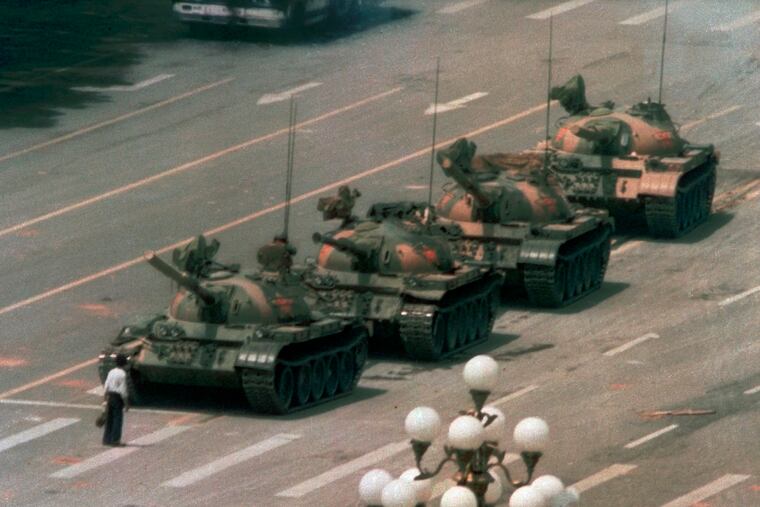From Tiananmen Square to Lafayette Square, Trump’s love of military undermines democracy | Trudy Rubin
His urge to send U.S. troops to cities and states spurs needed backlash.

On June 4, 1989, exactly 31 years ago, China’s military shot, killed, and arrested thousands of pro-democracy demonstrators in Beijing’s Tiananmen Square.
Tens of thousands of Hong Kong protesters came out with candles on Thursday in memory of the massacre, despite a Beijing-backed ban on their rally.
» READ MORE: U.S. must stand with Hong Kong against Beijing | Trudy Rubin
Yet, in 1990, Donald Trump, then a 43-year-old real estate magnate, praised the Chinese massacre. “When the students poured into Tiananmen Square, the Chinese government almost blew it,” Trump told Playboy magazine. “Then they were vicious, they were horrible, but they put it down with strength. That shows you the power of strength.”
The president clearly dreams of such unbridled powers as demonstrations continue over the death of George Floyd.
On Monday, Trump called Vladimir Putin, just before telling U.S. governors by phone that they had to “dominate” or “look like a bunch of jerks.” Perhaps Putin encouraged Trump to use riot police to forcefully clear peaceful demonstrators from Lafayette Square with pepper spray so he could pose for an autocrat-style photo op across from the White House. Arm raised with a Bible, he was flanked by his chief military adviser who wore battle fatigues.
Or maybe, the president was buoyed by another Monday phone call with Brazilian President Jair Bolsonaro, a Trump clone who hints he’d like his military to take over the country. We know that Trump has yearned for a military parade with tanks rumbling down the center of the capital.
As retired Lt. Gen. Russel Honoré, who coordinated U.S. military relief efforts for Hurricane Katrina, put it to a TV host, “He’s acting like he’s running Turkey, not the United States of America.”
But Trump is not Xi Jinping, nor are we China or Putin’s Russia, or Turkey where President Recep Tayyip Erdogan has imprisoned thousands of peaceful protesters. Or an Arab dictatorship such as Egypt’s, where other thousands of protesters, including journalists and leaders of the Tahrir Square uprising, languish in prison.
I have spent too much time in Iraq, Egypt, Turkey, Syria, Russia, and China to confuse those realities with Trump’s reality show pretensions.
No matter the president’s military fetish, no matter how despicable what happened in Lafayette Square, it is not Tiananmen Square. That’s what Americans must remember and act on as we try to figure out how to move ahead.
That does not mean Trump’s fake show of toughness isn’t dangerous. A normal president would have shown compassion, addressed the nation about racial grievances, invited governors and mayors to work with him. He would have quoted George Floyd’s brother, Terence, who eloquently pleaded for calm and warned that the serious destruction caused by looters (including in minority communities) was “not going to bring my brother back.”
» READ MORE: Memorial Day should have inspired unity, not red and blue divide I Trudy Rubin
Instead, Trump’s response was to threaten the use of the 1807 Insurrection Act to deploy U.S. troops to cities, whether or not mayors and governors consented, an act that has been used only in the most extraordinary circumstance.
However, Trump’s military overreach has been so egregious that it has stirred immense pushback, including from senior retired military. Most notably, former defense secretary and retired Marine general James Mattis issued a broadside accusing the president of dividing the nation. “Donald Trump is the first president in my lifetime,” Mattis wrote, “who does not try to unite the American people — does not even pretend to try. Instead, he tries to divide us.”
The general added that, when he swore to support and defend the Constitution upon joining the military 50 years ago, “Never did I dream that troops taking that same oath would be ordered under any circumstances to violate the Constitutional rights of their fellow citizens — much less to provide a bizarre photo op for the elected commander-in-chief with military leadership standing alongside.”
Mattis’ criticism was echoed by former chairman of the Joint Chiefs of Staff and retired admiral Mike Mullen. Perhaps from embarrassment, Secretary of Defense Mark Esper distanced himself from Trump’s call to use the military to put down civilian unrest.
These criticisms from the most senior level retired officers clearly signal that, unlike in China, or Russia, or Turkey, the military brass is deeply conflicted about a president who wants to use it as a political prop.
Similarly, despite the “send in the troops” call of uber hawks like Sen. Tom Cotton (R., Ark.), there is unease among many GOP politicians over Trump’s embrace of the military. Former Ohio Gov. John Kasich said bluntly that if Trump won’t call for unity and policy accountability from the White House, “mayors and governors must.”
Mattis made a similar point, saying, “We can unite without him, drawing on the strengths inherent in our civil society.”
This is what separates us from China, Russia, Turkey, Egypt, and others and the way their autocrats use the military to put civilians down. There is still a strong U.S. civil society that can push back against Trump’s military pretensions, before and during elections. The test for that civil society is now.